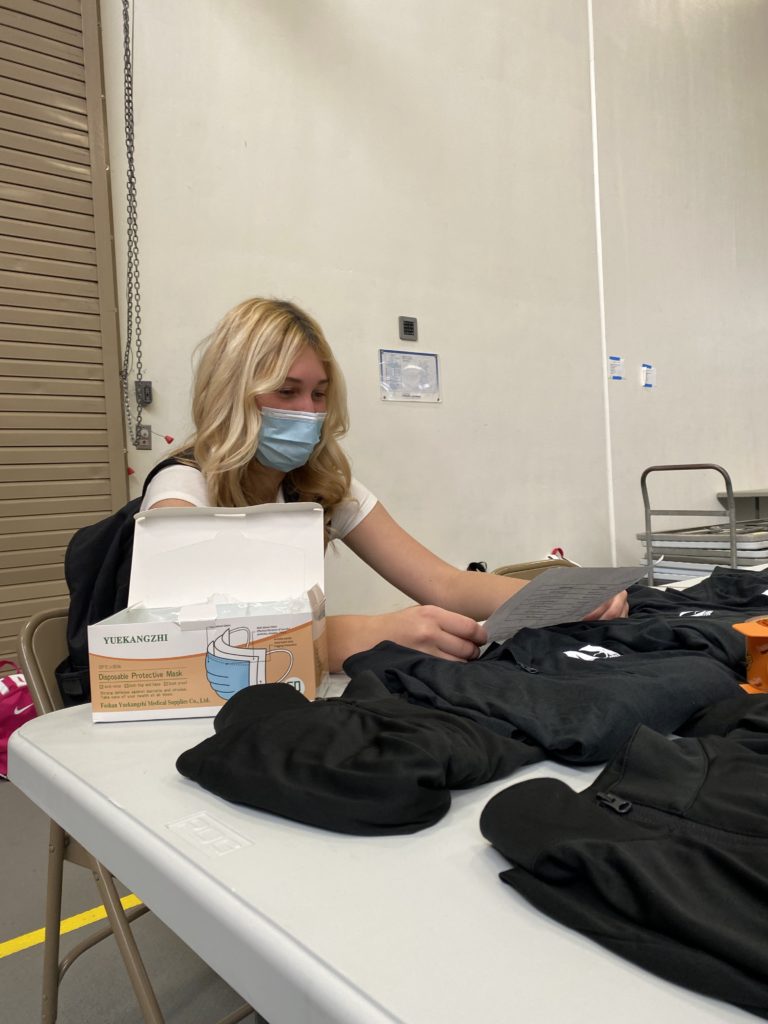While AT’s feeder junior high school Indian Trail more strictly enforces Covid prevention policies, administrations say the cause for variance lies in the difference between the political awareness of junior high versus high school students.
Both schools maintain similar contact tracing procedures when notified of a positive case–speaking with teachers, alerting low-risk students, contact tracing. The procedure is largely a result of Illinois Health Department (IPDH) guidelines.
The contrast lies in prevention mechanisms and enforcement of identical policies along with student compliance.
Indian Trail Principal Chris Jambrose shares District 4’s testing policy. “So we partner with the University of Illinois, the kids get tested once a week and we get the results essentially within 24 hours. If parents do not want their students to participate, we get an opt-out form, saying I don’t want my child to go through the SHIELD testing. Kids that are vaccinated do not have to go through the SHIELD testing.”
At AT, testing is voluntary for all students except in case of close contact or an outbreak.
Indian Trail has demonstrated success in identifying asymptomatic positive cases through opt-out testing, removing roughly 12 students from school per week.
“We typically receive one to two positive cases per week, so we start contact tracing on a Saturday, inform families that weekend, and 8-10 students are close contacts, so they are quarantined,” said Jambrose.
AT fully relies on self-reporting to identify potential Covid cases.
“We start Covid contact tracing when we receive notification of a positive case from the school nurse, front desk, or directly from administration,” said AT Principal Jack Andrews.
According to District 4 Assistant Superintendent Keri Karpman, Indian Trail has seen 33 positive Covid cases and 112 quarantine cases whereas AT has seen __ total positive cases and 33 quarantine cases.
A large attribution to this is the vaccination rates between the two schools because every student at AT has had access to the Covid vaccine since the start of the 2021-22 school year. Not every student at Indian Trail has.
From a broader standpoint, the enforcement of policy is indisputably apparent. At Indian Trail, the usage of masks is not a breeding ground of controversy. The policy has never been a debate ground: these students are completely receptive to rules.
“I have never gone beyond tapping my nose to redirect a student whose mask may have slipped. We are facing a lot of mask fatigue given it is December, but no student has refused to comply with the guidelines,” said Jambrose.
Whereas at AT, faculty members constantly ask students to wear masks properly, call home, and announce schoolwide reminders to properly wear masks.
“Administration and the deans have stopped students who we see for the tenth time with their masks just below their nose, and we’ll call home. [Calling home] is one level of effective, but no, we do not discipline every student who has their mask down. Some may be redirected, and sometimes it is a simple conversation on first offense,” said Andrews.
While Andrews describes this as short of ideal, he says the current situation is progression, a job well done.
“It is something so new to so many people that none of us will be perfect at it. The reminders are necessary for teachers, parents, community members, and students. It’s the rubbing on our ears, all those little nuances that we have to keep reminding and correcting ourselves on. We aren’t expecting people to be perfect at it, but we are asking you to be conscious of it. Do I think we’ve been perfect at it? Definitely not. But we’ve been pretty good at it,” he added.
In the United States, Covid precaution is far from being solely a public health issue: it is a political, social, and divisive issue between homes, the workplace, and schools. Covid resonates as a divisive issue as students’ awareness of the globe expands alongside their values and opinions.
Andrews shares his perspective on what the Covid conversation has become, inside and out of AT. “The mask conversation with some has become so sensitive, but there are very, very strong feelings out there. It’s almost taken away from how simple the mask conversation is. It has turned into a political, different conversation, and some conversations have been tough. They understand we have to wear them, but they are struggling to wear masks at home, so we imagine the student would be struggling versus parents who ask, ‘What do you mean they aren’t wearing their mask correctly?’”
Indian Trail administration, due to the plausible ignorance of younger students, has not dealt with any student refusal to comply with Covid regulation. Those who express strong opinions over guidelines at school likely repeat words uttered at home, but with junior high students, opinions never hinder the ability to satisfy expectations.
“As kids get older, as I was a high school teacher most of my career, and I noticed that over four years, kids would become more of their own independent thinkers as they get older. I know some kids here have expressed that they don’t believe in it, but they still comply [with Covid guidelines],” said Jambrose.
Opinions infiltrating the factual Covid conversation extend from the student body into the AT faculty. Staff members watch masks slip before administration does, and their perceptions often shape students’ adherence to Covid policy and guidelines.
Covid policy is a debated issue at AT as reflected in the Blazer staff and student body. The rebuttals and strong opinions regarding preventative measures create the controversial floor missing from Indian Trail, thus creating the varying levels of compliance to Covid guidelines between the two schools.

